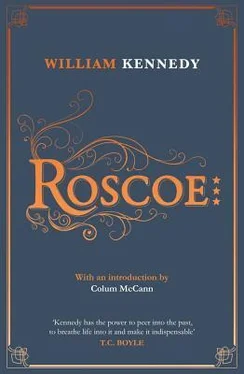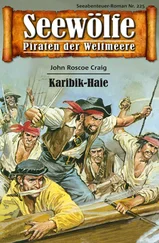Mac ate rotten smoked ham every day, hates ham, collected eggs, fed chickens, cleaned coops, hates chickens, walked horses to the pond, got squeezed between them, doesn’t like horses either. The farmer cursed Mac for mistakes, knocked him down with the flat of a pitchfork, he’ll kill me, Mac decided. At dawn he turned the horses loose, threw the sleeping farmer’s only shoes into the pond, left on the run, got a ride to Albany with a housepainter who hired him to do first coats, but the weather changed, no painting. His aunt also told him the bank was kicking her and Mama out of the house, three months’ rent overdue, so Mac went to Albany City Savings Bank and asked for President Henry J. Goddard, who was eating a banana.
“You want a banana, young fella?” President Goddard asked.
“My mother is losing her house and I have to help her.”
“How can you help?” the president asked.
“I’m a housepainter,” he said. “I clean and paint houses.”
“A regular contractor.”
“I can fix houses for the bank,” Mac said.
“This is a great, great country,” President Goddard said. “Put the boy to work.”
A bank guy took Mac to one of the bank’s worst houses, three floors, five apartments. “Forty dollars when they’re all cleaned, painted, and papered,” said the bank guy. “Here’s ten on account.”
Cleaning, painting was easy, but the wallpaper was peeling, filthy, Mac ripped it down. How do you put it up? Woman across the street saw Mac going in with armloads of wallpaper, watched him dump the same paper in the trash, something wrong. Woman, Hattie, asked Mac what happened. Mac said he’d put fifteen double rolls on five ceilings but it fell off. Hattie said she’d fix that and showed him the secret: a broom that swept the paper tight and straight. Mac got the knack, collected his thirty dollars, and bought his mother a hundred roses and a toy diamond ring.
Mac moved into Hattie’s house, went to school, got work delivering oysters anyplace for Bill Keeler’s restaurant, including whorehouses. One of the Poole sisters let him in one night, took the oysters, put them in dirty dishwater. She left Mac in the kitchen, didn’t pay him, went into the parlor, and fell over. Mac looked in and saw the four Poole sisters, good-looking whores, all whacked on the pipe, money on the table. Mac pocketed the money and grew out of oyster transport, but not before he got to know whores, and liked a few.
He stayed on with Hattie, quit school after eighth grade, and grew up with chalky teeth and the wrong jobs, housepainter, would-be carpenter. Then, one day, Hattie told him to go see O. B. Conway, the police detective who was king of the night, and Mac became a cop.
Mac Rising
In 1928, after he disarmed, with a garden rake, a one-eyed Polish psychotic wielding a shotgun, an act of indisputable initiative, dexterity, and courage, O.B. persuaded the chief: Take Mac out of uniform, make him a detective.
In 1929, after Pauly Biggers killed two people and took a fourteen-year-old girl hostage and said he’d kill her, too, if they didn’t let him drive to Canada, Mac, unarmed, talked an hour and ten minutes to Pauly, making the Canadian escape arrangements. When Mac and Pauly finally agreed and shook hands on it, Mac shot Pauly between the eyes with a.22 pistol device he had rigged into the left armpit of his coat, in emulation of Albany’s Silent Gunman of 1916. O.B. got Mac a ten-dollar raise.
In 1930, Mac and O.B. found four members of the Polka Dot Gang, who all wore polka-dot ties on the job, raiding a boxcar loaded with alcohol destined for Al Brisbane’s two downtown drugstores. Mac shot two of the three, but O.B. got hit in the leg and went down in the open. Mac stood up and covered him, two guns blazing, pulled him out of danger, shot a third Dotter (the fourth got away), but took a bullet in the side, and everybody went to the hospital. Mac was wearing a silk shirt, and when they pulled the shirt out of his wound, out popped the bullet, no surgery needed. Mac realized bullets don’t go through silk, and after that O.B. also wore silk shirts. O.B. threw a party for Mac, thanks for saving my life, and bought him a new.38 police special with a pearl handle.
Mac and O.B., close as brothers, roamed the city, and Mac met Patsy, who was Jesus, also Moses. O.B. had organized the truck convoys that brought Patsy and Bindy’s beer into town early in Prohibition and was so savvy and ruthless Patsy made him deputy chief of the Night Squad, with orders to keep out hotshot hoodlums and freelancers with beer to sell. Nobody but the organization sells beer in Albany. Let no hoodlum set up shop in our town. Mac and O.B. shot up several trucks of Italian bootleggers who ignored the rules, also several Italians. Patsy thought the world of Mac and his shooting, but O.B. was Patsy’s man, and in 1930 Patsy made him supreme boss of the Night Squad.
Mac and Pina: A Love Mess
Mac met a cute singer at the Kenmore and they married and lasted long enough to have twins. One morning Mac’s wife, in her small black hat and fur jacket, stood in the doorway saying, “If you want me, come after me.” Mac said, “You’re back in two days or don’t bother,” and watched her high heels, her black stocking seams, and the sweet swagger of her ass as she walked to the taxi. The end. Mac bought a two-family house on Walter Street, moved his sister in downstairs, no rent if you raise the twins, Sis. Mac lived upstairs and saw the twins sometimes. One night at Joey Polito’s Spaghetti House (opens 3 a.m., two broads always, no spaghetti), Mac saw Giuseppina serving drinks, just off the boat.
“You like?” Joey asked Mac. “I dress her up for you.”
Joey sent Pina into the ladies’ room with a suitcase and she came out, Madonna santa, too much for this joint. You shoulda seen her. Mac got her a waitress job in a real restaurant with good tips, and then it was Mac and Pina. One customer, a car dealer, gave her a Pontiac. She had no license, but she drove to Atlantic City for a garment makers’ convention, came back, and threw eleven hundred in tens, twenties, and fifties on her bed for Mac to see. Some tips. He could have cried over how great she looked, that long black hair, those perfect calves, those fantastic tits, how she rose so high in the world working for tips, which is what she called it. Do what you know how, was Mac’s credo. Mac and Pina, for months and months. Mac and Pina, this could last.
O.B. got to like Pina’s looks. One morning, after work, when Mac was going to Pina’s place, he saw O.B. come out and get into his car. Some say O.B. should not have done this, and Mac is a member of that club. Pina said O.B. paid for what he got, just another Giovanni. Mac made an effort to believe her. Pina could’ve given Mac the clap, the crabs, and the syph, he wouldn’t mind as long as she was there after work. But then she stayed out. Where? Mac tried patience, but had none. The way his wife left him, bingo, he left Pina, who moved out of her place and in with the Dutchman, upstairs over the Double Dutch nightclub, where the Dutchman had B-girls of his own but none like Pina. Pina liked the Dutchman’s big apartment, nice plants, thick rugs, picture window looking at the river, watch the boats go by. Dutchman played Italian music for Pina, Mac never thought of that. Dutchman gave her a diamond big as the end of a cigarette, Mac couldn’t afford that. Dutchman bent her in two, tied her up, gagged her, Mac didn’t go for that stuff, didn’t know Pina did, a girl’s gotta have her fun. Pina would still screw Mac silly if he came around, but Mac gave up Pina. Everything except thinking about her.
Mac and Jack
Roscoe stuffed himself into the front seat of Mac’s car for the ride to the Notchery, imagining what was happening inside Mac’s head, same old thing, revving himself up with the necessary iron to face the unknown worst the world offered him day after day. But today had substantially more gravity, as Mac prepared to lead the invading army into a war between the McCall men maddened by the will to excess, power gone berserk, not a first for either brother. When these fellows are wrong they are wrong fortissimo.
Читать дальше












